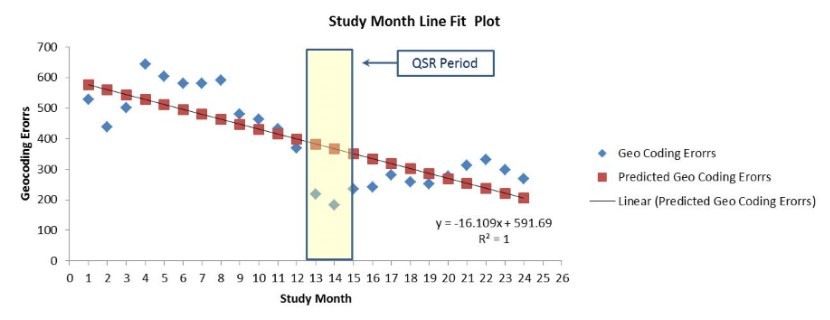The Power of Feedback in Modern Policing

Did you just say something?
A couple of years ago I was working on my capstone for my graduate degree. Combining my nerd and perfectionist traits, I had decided to look into the quality of police reports (aka: Improving Police Incident Reporting: Raw Data Quality Characteristics and the Review Process).
As with so many other things in life, serendipity (that, and an awesome PhD Chair) opened my eyes to an important element in the quality process: feedback. As with most other major grad papers, I needed to show that I could use data in a meaningful way and demonstrate the same. I wrestled with this, as most of the work was based on literature review and published testimonials (for example, the Metropolitan Nashville, Tennessee, Police Department had embarked on a very good quality review project). I did stumble on a relationship though, that showed how important feedback is.
During the months it took to work the paper up, I had an opportunity to utilize a supervisor’s report reviewing skills (and in his case, he is truly dedicated and gifted); for a limited time, he scrutinized department wide reports for errors. One of the many elements he was watchful for was geocoding (the end use of addresses and beats recorded by reporting officers); the bane of existence, if not the living nightmare of every police crime analyst. The sergeant would critique the report and an email would be sent to the officer simply pointing out areas for improvement; rarely asking for a correction to be made.
Here’s the cool thing: from the day the critique emails started to go out, until the day the project ended; geocoding improved dramatically, dropping sharply from a trendline! I did not stay too excited; the error rate bounced back to ‘normal’ when the feedback stopped.

So, where else would feedback be of value?
We know feedback works and we know it has value; but where and how often is it taking place? Here are some ideas to consider:
Training
No doubt here; the entire concept of training from basic, through FTO and inservice would be entirely useless if feedback was not delivered earnestly and frequently. Constant and consistent testing and evaluation takes place in most police departments, ideally carefully documented. You have to know what training works and what training does not work.
Officer Safety
Maybe the most important place of feedback in the industry. See “Training” above for where this starts, and it certainly has to continue on the road, and is everyone’s responsibility. See something, say something. Mentor, refine, remind, remediate, supervise.

Speaking of supervision, the best I have ever seen was at a seminar where the one and only J.D. Buck Savage presented a program on officer safety and articulated a distinction between a supervisor and an observer, emphasizing that too many of the former, are actually the later. That stuck with me, sometimes angers me that someone would take the test, take the role and not take on the entire responsibility.
…how can we expect consistent quality performance without providing officers feedback as to how they are performing? Dave Lyons
Performance
As with safety, how can we expect consistent quality performance without providing officers feedback as to how they are performing? Constructive of course. Facilitative if there is a need for development and improvement. This should never be left up to scheduled performance appraisals (which, are seldom of any value for a myriad of reasons, thank you for the amen), it should be everyday and personalized to work with the officer’s readiness. Contrary to the opinions of the anti-police crowd, police come to work everyday and everynight to do the right thing; they still need someone who cares about them to nudge and guide them. This, by the way, is the first-line defense against harmful police subcultures, another topic of it’s own.
Report Quality
As I mentioned above, the quality of police reports is crucial. Reports are an immortalized representation of the officer, the department and the policing industry. An officer can appear as a dullard or a professional, in 300 words or less. Reports are currency in the business of customer service, and the foundation for case work that makes it to hearings and trial. Inferior reports can have adverse impacts on planning and the use of valuable resources. I would argue that a worthy investment by any police department would be a quality assurance and control unit, much like Nashville.
An officer can appear as a dullard or a professional, in 300 words or less. Dave Lyons
Department Branding & Reputation
Internal and external feedback is needed to measure where the department is with regard to its brand and reputation. No successful company assumes where they are in the market; constant research and environmental scanning is in motion to stay on a sharp edge. Police should be no different, especially in the volatile and tenuous times we live in today. Listening to employees, monitoring discipline issues and complaints, investigating grievances keep and eye inhouse; focus groups, community meetings and meaningful surveys keep an ear to the ground externally. The most important facet of communication is listening; so listen carefully to your community.
Continuous or Process of Ongoing Improvement (POOGI)
Whether the department formally pursues continuous improvement, or there are change agents pocketed in the agency that move as process of ongoing improvement, learning what is working and what is not working is critical. Feedback is a data element that green and black belts will use to identify constraints, and evaluate interdictions that are made to increase efficiency.
Mission Statements, Strategies, Goals and Objectives
All of these are only words on paper if they are never evaluated for success or failure and feedback is where the lessons are learned. Why ever publish a goal if it is never measured for success? Why issue a mission statement is one never knows whether or not the mission is being met?

Michael Ikechukwu Diogu, FIMC, CMC.
Senior Administrative Manager & Crisis Management Consultant at Interra Networks Limited.
What a great in-put! That is. Feedback, among other factors, is an essential pre-requisite of every, genuinely, successful business!
Tony Knox
300 words or less…..outstanding
chuck sallee
Retired.
Dave, Good article. Of course you lost me with the geo-coding and data validity concerning reports usability. Chuck
Dave, I thought your article hit a lot of the right notes, and is easily supported with work from Hattie and Timperley (2007) who suggested Not all feedback is created equal. In their report feedback is conceptualized as information provided by an agent (e.g., teacher, peer, book, parent, self, experience, etc.,) regarding aspects of one’s performance or understanding; thus feedback is a “consequence” of performance.
What my research has concluded is that Feedback can be labeled by three general categories:
Positive,
Negative, or
Neutral;
Further, I found that Positive feedback manifests itself in three ways:
Constructive,
Corrective, or
Praise.
Obviously the example you provide incorporates all three elements which obviously enhanced performance of reporting officers responsible for geocoding input. The results speak for themselves.
References
Hattie, J., & Timperley, H. (2007). The power of feedback. Review of educational research, 77(1), 81-112.) http://asp.evaluationdesign.co.uk/wp-content/uploads/2013/05/power-feedback.pdf
Matthews, E. (2014) Leadership for Law Enforcement [PowerPoint slides]. Retrieved from http://tiny.cc/LELWKSHP
Eugene Matthews, Ph.D.
This is a great example of the value, and power, of feedback. There is probably no one who doesn’t ‘need’ feedback, but few of us are actually willing to ask for it, and some refuse to listen to it.
~
EM
nice article good information thanks for sharing..